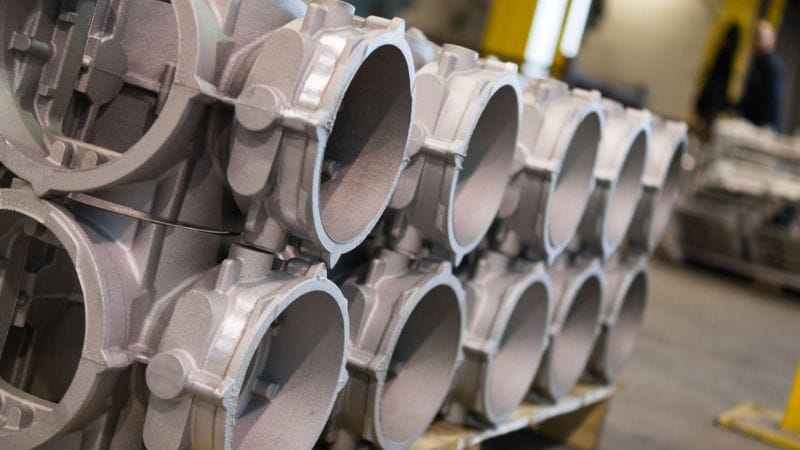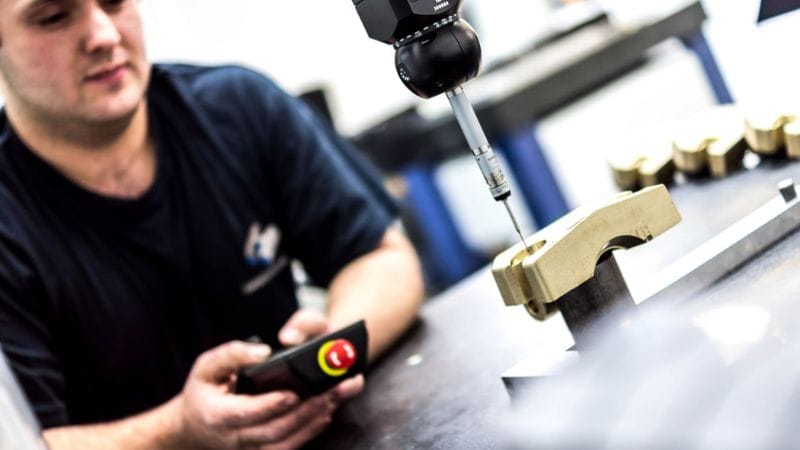How to choose a metal castings supplier
Published - 22nd Sep 2025
Find a casting supplier who delivers high quality, meets industry standards, and supports your project from design to delivery.
Choosing the right metal castings supplier is one of the most important decisions you’ll make in any manufacturing project. In industries where performance, safety and compliance are critical — such as aerospace, defence, marine, energy and medical — the right supplier is your technical partner, helping you achieve the right quality, lead time and lifecycle costs.
Our comprehensive guide to metal castings explains the different methods, their benefits, and typical applications. This article focuses specifically on what to look for when selecting a supplier, so you can make a confident, commercially sound choice.

Understand the right casting method for your part
Your first step is to determine which casting process best suits your component’s geometry, performance requirements and production volume. Each method has unique advantages, and your supplier should be able to explain why a certain approach is most suitable for your project. For example:
- For complex or lower-volume parts with intricate geometries, sand casting offers flexibility and lower tooling costs.
- For medium-to-high volume production where surface finish and repeatability are priorities, gravity die casting is often the better option.
A supplier with metallurgical expertise and experience in multiple processes can give you an unbiased recommendation. Be wary of suppliers who push only one method without assessing whether it’s truly right for your application.
Check the casting industry experience of your supplier
Experience in your specific sector can significantly reduce risk. Industry knowledge ensures the supplier understands the standards, documentation and compliance requirements that apply to your project.
For example:
- Aerospace and defence: parts must often meet tight tolerances, pass non-destructive testing, and include full material traceability.
- Marine: components need excellent corrosion resistance and fatigue strength for long service life in saltwater environments.
- Medical: production may require clean handling and repeatable, defect-free results for patient safety.
A supplier with relevant sector experience can anticipate potential issues, offer process improvements and streamline approvals. For more on industry-specific casting applications, see precision sand and gravity die casting for the defence sector, or high specification sand castings for the aerospace industry.
Verify your casting supplier’s technical capabilities
A capable supplier offers more than just casting. Look for a partner who can support you through the full product lifecycle:
- Design for Manufacture (DfM): early-stage collaboration to optimise your component for the chosen casting method, improving quality and reducing machining costs.
- In-house machining and finishing: the ability to deliver finished parts to specification without outsourcing, reducing lead times and coordination issues.
- Range of materials: capability to work with aluminium, alloy steel, carbon steel, stainless steel, copper, magnesium and other alloys to meet performance targets. If you’re unsure about which metal to choose, our guide to choosing the right aluminium alloy for your casting explains the properties and ideal applications for the most common aluminium alloys.
Evaluate casting quality assurance and testing
Quality control is vital, especially in safety-critical industries. Strong suppliers invest in both the people and the technology to maintain consistent standards. Look for:
To understand these processes in more detail, see our guide to quality control in metal casting.

Review global sourcing and supply chain capabilities
UK-based manufacturing offers advantages in quality control and traceability, and shorter lead times. However, certain projects may benefit from global sourcing — particularly high-volume production or cost-sensitive parts.
Suppliers with a well-managed global network can offer:
- Dual sourcing: reducing supply chain risk and enabling rapid response to demand changes.
- Hybrid production models: combining UK prototyping with overseas volume manufacturing.
- Approved partners: de-risk overseas facilities by using a partner who will check they meet quality and compliance standards.
At Haworth Castings, our role within Expromet Technologies Group gives us access to both UK and trusted overseas facilities, combining flexibility with robust quality management.
Assess commercial fit
Price is important, but the cheapest option can become the most expensive if it compromises quality or delivery. Consider:
- Transparent pricing: including tooling, per-part cost, and any finishing or machining charges.
- Lead time reliability: consistently meeting agreed delivery dates, even under tight schedules.
- Prototyping capability: support for one-off and small batch runs to validate design before full production.
A supplier that balances competitive pricing with dependable delivery and strong technical support will typically deliver the best long-term value.
In summary – finding your ideal supplier
The best metal castings suppliers combine technical expertise, robust quality systems, flexible sourcing and a collaborative approach. They act as true partners in your project, working with you from initial design to final delivery.
Before making your decision, ask questions that will reveal both capability and approach:
- Which casting processes do you specialise in? Can you advise on what is best for my component?
- Can you advise on materials – what is your experience with my required alloy?
- Can you provide references or case studies in my sector so I can be confident of your capabilities?
- How do you ensure consistency across production runs?
- Do you offer in-house machining and finishing?
- Can you support design for manufacture from the concept stage?
- What quality certifications do you hold? Are you JOSCAR-accredited?
- Do you offer sourcing options? How do you manage overseas suppliers?
Choose Haworth Castings, a trusted UK metal castings supplier
With over 70 years’ experience in sand casting and gravity die casting, Haworth Castings delivers precision-engineered metal castings for aerospace, defence, marine, medical, and renewable energy sectors.
As part of the wider Expromet Technologies Group, we offer a range of metal-forming capabilities designed to ensure the best solution for your exact requirements. Our expertise is supported by in-house machining, global sourcing and full project management. Expromet Group companies carry out comprehensive quality control and testing, and between them hold triple ISO certification, AS9100 (aerospace & defence), ISO 3834-2 (welded fabrications), EN15085 (rail and rolling stock), Cyber Essentials certification and JOSCAR accreditation (aerospace and defence).
Contact us today to find out more about Haworth Castings: a casting supplier delivering high quality components, meeting or exceeding industry standards, and supporting your project from design to delivery.
FAQs: Choosing a metal castings supplier
- How do I know if a casting supplier is high quality?
Look for proven experience in your sector, recognised certifications like ISO 9001, in-house machining and strong quality control methods. Read case studies and testimonials from existing customers. - Should I choose a UK-based or overseas supplier?
It depends on your priorities. UK suppliers often provide better quality control and faster delivery, while overseas suppliers may be more cost-effective for large production runs. The best option is a supplier who can offer both and advise on the right mix. - What’s the difference between sand casting and gravity die casting?
Sand casting is flexible, cost-effective for low to medium volumes, and suited to complex shapes. Gravity die casting is better for higher volumes, tighter tolerances and improved surface finishes. - Do all suppliers work with every type of alloy?
No. Some suppliers specialise in aluminium, while others work mainly with steels, copper alloys, or magnesium. Always check their alloy expertise matches your project requirements. - Can a supplier help with design?
Yes — the best suppliers offer Design for Manufacture (DfM) support from the start. This helps optimise the part for casting, improve quality, and reduce costs in machining and finishing. Read more about Design for Manufacture at Haworth Castings here. - How important is in-house machining when choosing a supplier?
Very important. In-house machining means the supplier can take your casting from raw part to finished product without outsourcing, saving time, reducing costs and improving quality control. - What certifications should a good casting supplier have?
At minimum, look for ISO 9001 certification for quality management. For certain industries, check for sector-specific approvals like JOSCAR for defence, UKAS-accredited testing, or ISO 13485 for medical components. - How can I tell if a supplier has strong quality control?
Ask about their inspection methods. Good suppliers will use CMMs for dimensional checks, as well as non-destructive testing like X-ray, ultrasonic or dye penetrant inspections. Consistency in these processes is key. - What questions should I ask before placing an order?
Ask about their process capabilities, material expertise and whether they offer global sourcing options. Also check if they can support prototypes before full production. - Can a single supplier handle both prototyping and full-scale production?
Yes — many advanced foundries can make one-off prototypes and then scale up to full production in the same facility. This gives you consistency in quality and reduces the risk of design changes being lost in handover.

